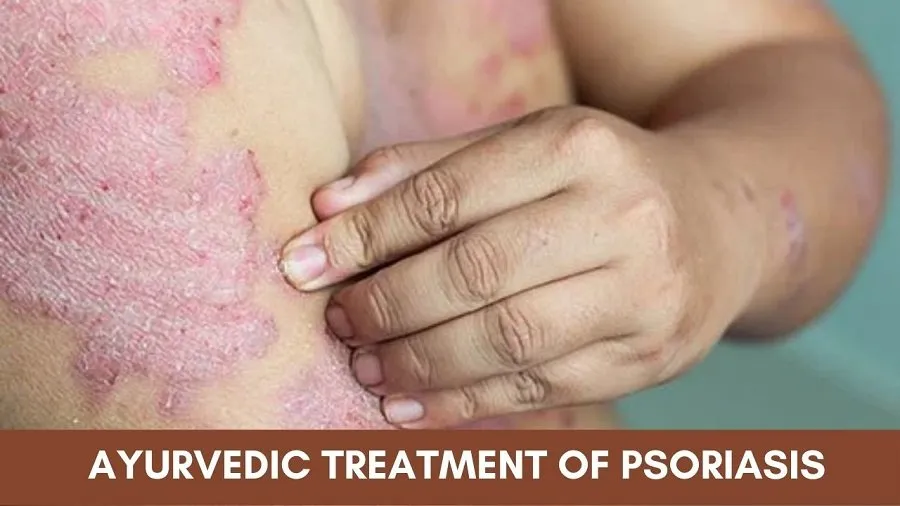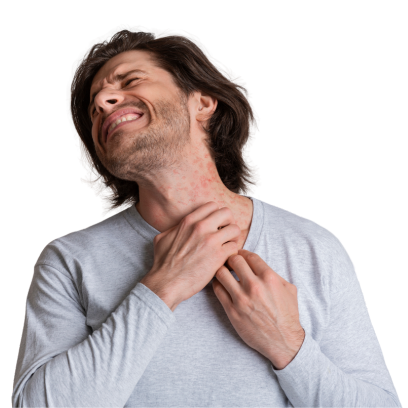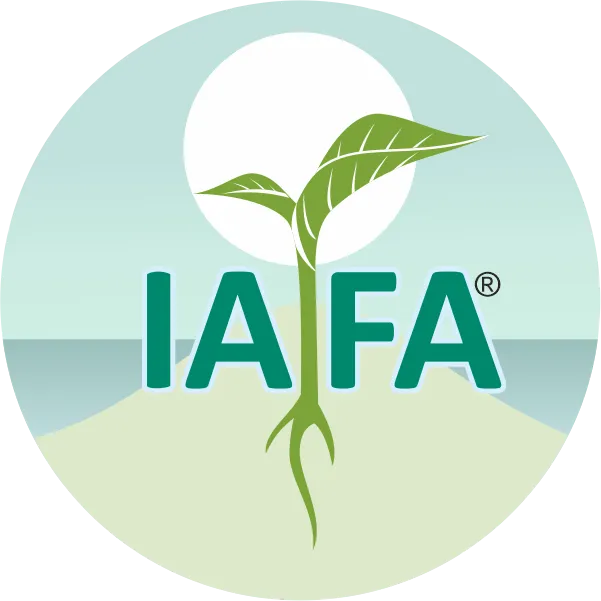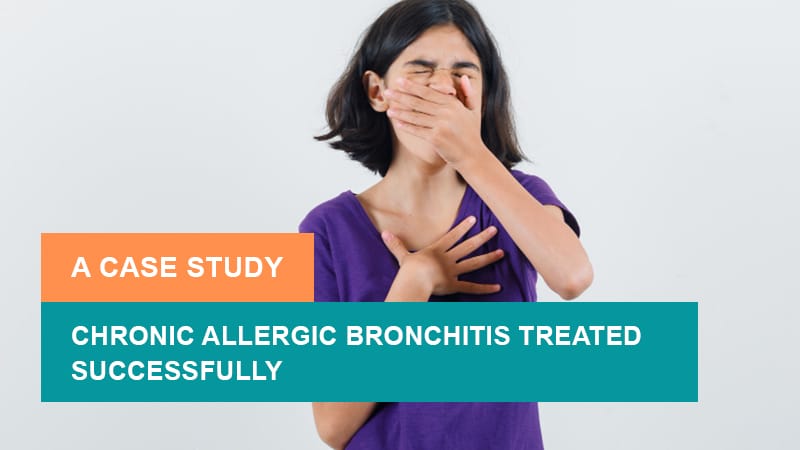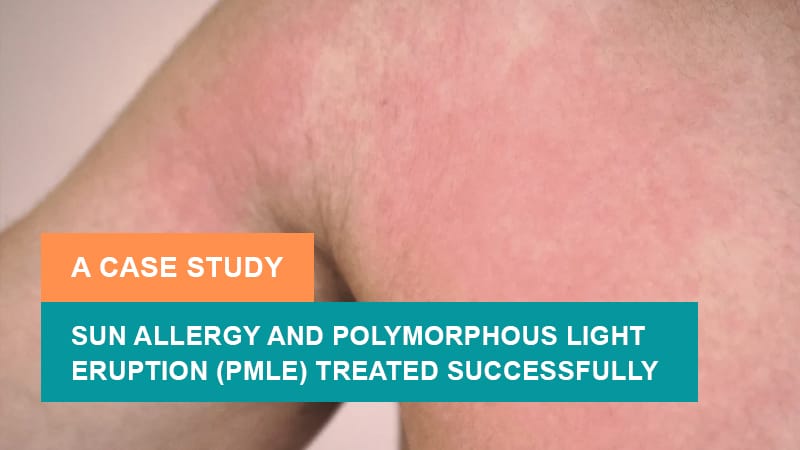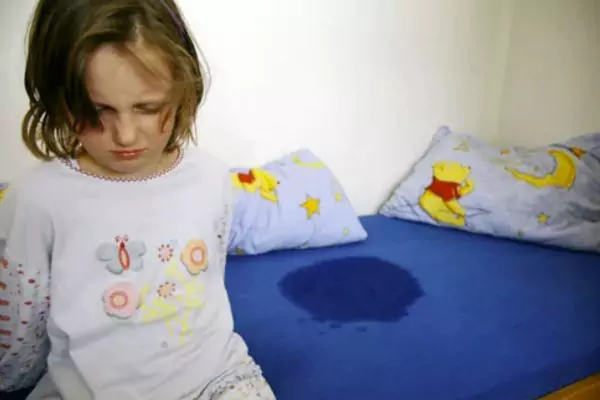On This Page
Introduction
An auto-immune skin disorder, non-infectious, chronic, and well-defined by red scaly plaques is psoriasis. It can affect any part of the body. In Ayurveda Psoriasis is considered under Kustha Roga and particularly due to distinct clinical features it is correlated with Ek Kustha. As per Ayurveda skin disorder is attributed to an imbalance of Tridosha i.e. Vata, Pitta, kapha but Psoriasis (Ek Kustha) occurs mainly by vitiation of Vata, Kapha, and also skin (Twaka), blood (Rakta Dhatu), muscle tissue (Mamsa Dhatu) are involved. Improper diet (Viruddha Ahara), genetic predisposition, and lifestyle contribute to psoriasis. An integrative approach is used to treat psoriasis as per Ayurveda, which includes detoxification therapy, various herbs, formulation, yoga, personalized diet, etc.
Here, you will find the causes, symptoms, diagnosis, and Ayurvedic treatment for psoriasis like Panchakarma Procedures (internal purification of the body), Yoga procedures, Single Herbs, Diet and Lifestyle modification, etc. The treatment helps in balancing the vitiated Tridosha, which will certainly help to treat Psoriasis.
What is Psoriasis?
An autoimmune disorder, which is complex and multifactorial and is characterized by rapid skin cell turnover, leading to the formation of thick, scaly patches on the skin, and the non-contagious disorder, is known as Psoriasis. The patches that are formed in psoriasis are inflamed, often red, and covered with white silvery scales known as plaques. This non-contagious disorder can affect any part of the body, but it mainly appears on the scalp, knees, elbows, lower back, etc.
Psoriasis – As Per Ayurveda
The father of medicine Acharya Charaka has mentioned that Kushtani Vapuhu Iti Kushta means which makes skin disgraceful and ugly which destroys Twak and another Dhatus is called Kushta (skin disorder). Psoriasis is one of the Kustha Roga and in clinical manifestation, it resembles Ek Kustha which is a Kshudra Roga (Minor skin disorder). Ek Kustha is mainly caused by the dominance of Vata, Kapha Dosha also skin (Twaka), blood (Rakta Dhatu), muscle tissue (Mamsa Dhatu), watery fluid similar to lymph (Lasika) are involved. The imbalance of Vata and Kapha Dosha is mainly attributed to an incompatible diet (Viruddha Aahara), toxin formation (Ama), and various lifestyle factors. As per Ayurveda Psoriasis (Ek Kustha) requires treatment for a longer duration and is considered a long-time-consuming disease.
Who Gets Affected by Psoriasis?
As Psoriasis is an auto-immune disorder, the individual who has a family history of Psoriasis, or especially individuals who are exposed to various triggers like stress, certain medication, infections, etc. are at high risk of having psoriasis. It affects people of all ages, genders and mainly develops between 15-35 years.
How Common is Psoriasis?
Psoriasis affects approximately 125 million people worldwide with a prevalence of 0.33 to 0.6 % in different races. The survey revealed that approximately 2- 4 % of the population is affected by psoriasis in Western countries. In the United States, the prevalence of psoriasis in adults is 3%.
Reference: Armstrong, A. W., Mehta, M. D., Schupp, C. W., Gondo, G. C., Bell, S. J., & M Griffiths, C. E. (2021). Psoriasis Prevalence in Adults in the United States. JAMA Dermatology, 157 (8), 1. https:// doi. Org/ 10. 1001/JAMA Dermatol. 2021. 2007.
As per the WHO Global Report on Psoriasis, 2016, in India, the prevalence of Psoriasis is approximately 0.44 to 2.8%. As per the survey, this disease is more common in older people than adults.
Causes of Psoriasis – As Per Ayurveda
The few most important causes of Psoriasis as per Ayurveda are mentioned below:-
- Incompatible food (Virrudha Ahara): Incompatible food like the use of fish with milk, salt with milk, etc. are common reasons for having psoriasis.
- Faulty food pattern (Mithya Ahara): Taking another meal before the previous meal is digested is also the culprit behind psoriasis diseases.
- Intake of an excessive amount of heavy food (Atyaashana): intake of excessive amounts of heavy food leads to vitiation of Mamsa Dhatu (Muscle tissues).
- Suppression of natural urges (Adharniya Vega Dharana) like vomiting (Chardi)
- Daytime sleeping (Divaswapna): This leads to the vitiation of Kapha.
- Improper administration of detoxification therapy (Panchkarma)
- Verbal sinful activities: These lead to the vitiation of Mansika Dosha Raja and Tama in the body.
- Behavioral sinful activities: These lead to vitiation of Mansika Dosha Raja and Tama in the body.
Causes of Psoriasis (Modern Aspect)
- Genetic predisposition: Mutation in PSORS1 genes in the individual results in psoriasis.
Reference: Allen, M. H., Ameen, H., Veal, C., Evans, J., Ramrakha-Jones, V., Marsland, A., David Burden, A., Griffiths, C., Trembath, R. C., & Barker, J. N. N. (2004). The Major Psoriasis Susceptibility Locus PSORS1 Is not a Risk Factor for Late-Onset Psoriasis. Journal of Investigative Dermatology, 124 (1), 103- 106.
- Immune response: As psoriasis is an auto-immune disorder, an overactive immune response or self-defense response acts as a major cause of psoriasis.
- Medication: Certain medications like corticosteroids, lithium, beta-blockers, etc, are culprits behind psoriasis.
- Environmental triggers: Carious skin trauma, stress, various infections, sunburn, etc.
- Lifestyle factors: Excessive intake of alcohol, smoking, etc. are also leading causes of psoriasis.
Symptoms of Psoriasis – As Per Ayurveda
A) Pre-Symptoms of Psoriasis (Purva Roopa of Ek Kustha)
Anaesthesia (Sparsh Agyatavam), Discoloration (Vaivarnya), Eruption of rashes (Kotha), Excessive pain (Shoola), Horripilation (Loma Harsha), Pruritis (Kandu), Numbness in limbs (Supta Angata), Pricking pain (Toda), Fatigue (Shrama), Excessive sweating (Ati Sweda), Exhaustion (Klama), Rapid formation and chronicity of ulcers (Shighra Uttapati and Chir Sthiti), Burning sensation (Daha), Twakaa, Dryness of skin (Twaka Parushyata) are the pre- symptoms of the psoriasis.
B) Symptoms of Psoriasis (Roopa of Ek Kustha)
The absence of sweating (Aswednam), extensive localization, bigger lesions (Maha Vastu), and plaques resembling the scales of fish (Matsyo Shaklo Pamam) are the common symptoms of psoriasis. Along with this various other symptoms like burning sensation (Daha), itching (Kandu), thick, dry scaly skin (Rukshata), and oozing (Strava) are the symptoms that are seen in psoriasis.
Symptoms of Psoriasis (Modern Aspect)
- Thickened skin
- Red patches on the skin are usually covered with silvery white scales
- Bleeding from the skin due to cracking of the skin
- Pitting, discoloration, and detachment of the nails
- Stiffness in the joint
- Joint pain
The last two symptoms i.e. stiffness in the joint and joint pain are seen in psoriatic arthritis.
Types of Psoriasis
Mainly five types of psoriasis are mentioned below:-
- Plaque Psoriasis
- Guttate Psoriasis
- Inverse Psoriasis
- Pustular Psoriasis
- Erythrodermic Psoriasis
1. Plaque Psoriasis
The most common kind of psoriasis is known as Plaque psoriasis which tends to appear on the scalp, limb, and trunk, especially in the elbow and knees. In this type of psoriasis, red patches that are covered with white silvery scales are developed in the body in a symmetrical pattern.
2. Guttate Psoriasis
In this type, small, drop-shaped lesions are formed and usually affect young adults and children. The red dots in this type of psoriasis usually develop on limbs and torso. When there is an upper respiratory infection, then the outbreak of Guttate Psoriasis usually occurs.
3. Inverse Psoriasis
This type of psoriasis mainly involves the folds of skin like in the axilla, beneath the breast, groin regions, etc. Smooth red patches are formed in this type and this type is mainly triggered by sweating and rubbing the affected area.
4. Pustular Psoriasis
As the name implies, in this type of psoriasis pus formation occurs. Pus-filled blisters are formed which are surrounded by red color inflamed skin and cover almost the whole body but are mainly seen in the hands and feet. Stress, infection, etc. are considered the commonest triggers for pustular psoriasis.
5. Erythrodermic Psoriasis
The severe and rare form of psoriasis is known as erythrodermic psoriasis. This type is mainly triggered by medication like corticosteroids, sunburn, etc., and mainly affects people with uncontrolled other types of psoriasis. Red scaly skin appears and shedding of skin occurs on the whole body in this type.
Diagnosis of Psoriasis – As Per Ayurveda
For diagnosis, the Ayurvedic physician will do a detailed examination and observation of the skin lesion, associated symptoms, bleeding, dryness, etc. Palpitation of the skin will also be done to assess the tenderness and texture of the skin. Along with this detailed analysis of the causative factors, pre-symptoms, progression, etc. will be done. Various questions will be asked to the patient related to their dietary habits, mental health, lifestyle, etc.

“Dr. Gupta’s IAFA is a promising institute in the management of several health disorders. Institute of Applied Food Allergy® provides the best available and scientific treatment for Psoriasis to reduce the weird symptoms as well as its repeated occurrence”.
Rely upon IAFA and you will enjoy the blessing of good health!!!
– Dr. Sahil Gupta (B.A.M.S., M.H.A.)
Ayurvedic Allergy Specialist
CEO & Founder of IAFA®
At last, Easier Psoriasis Management

Trusted by
More than 90,000 Patients

Convenient
at-Home Treatments

9.2 / 10
Customer Satisfaction Score
Ayurvedic Treatment for Psoriasis
The Ayurvedic treatment for psoriasis mainly focuses on balancing the Dosha mainly Kapha, Vata and also restoring the balance of skin (Twaka), blood (Rakta Dhatu), muscle tissue (Mamsa Dhatu), watery fluid similar to lymph (Lasika) through Shodhana (purificatory), Shamana (palliative), dietary regulation (Pathya-Apathya), lifestyle modification, etc. Psoriasis is a chronic disorder that is time-consuming and requires treatment for a longer period.
IAFA Ayurveda provides effective purificatory and palliative therapies for the successful Treatment of Psoriasis. Dr. Gupta’s IAFA is the perfect destination for treating Psoriasis as well as other types of skin disorders. The Ayurvedic approach that is used to treat Psoriasis is as follows:-
Detoxification Therapy (Shodhana Therapy) for Psoriasis
1. Emetic Therapy (Vamana) – For expelling excessive Kapha from the patient of psoriasis, controlled therapeutic vomiting is done.
Benefits: Emetic therapy helps in the removal of Kapha Dosha from the body, one of the culprits behind psoriasis, and thus helps in reducing the thickening and scaling of the skin. By emetic therapy metabolism and digestion improve which prevents the formation of toxins (Ama), alleviates symptoms like itching and skin inflammation, etc. After emetic therapy oral medication is given to patients of psoriasis which gives the best result.
2. Purgation Therapy (Virechana) – Therapeutic purgation is also done in psoriasis patients with the help of various herbs to cleanse the blood, liver, and intestine.
Benefits: Purgative therapy is done which not only detoxifies the body by eliminating deep-seated toxins but improves overall skin health and helps to reduce symptoms like burning sensation, redness, inflammation, etc.
3. Bloodletting Therapy (Rakta Mokshana) – With the use of various techniques like leech therapy (Jalauka Avcharana), the removal of impure blood is done from the body in bloodletting therapy.
Benefits: This therapy provides immediate relief in localized lesions of psoriasis along with this it helps to remove toxins from the bloodstream, improves microcirculation, and reduces itching, skin discoloration, scaling, etc.
4. Medicated Buttermilk Therapy (Takra Dhara) – In this therapy, continuous medicated buttermilk (Takra) is poured over the head for a certain period.
Benefits: It helps to eliminate major triggers of psoriasis i.e. stress and calms the mind. It further helps in improving immunity by modulating the overactive response of the immune system. It also helps in soothing the nervous system.
As per Ayurveda for the treatment of Psoriasis selection of drugs is based upon the mentioned principles i.e. Drugs having the properties of Rasa, Rakta Prasadana, Rasa, Rakta Shuddhi Karan, Rasavaha, Raktavaha & Swedavaha Sroto Shodhana. For these various bitter and astringent herbs (Tikta and Kashaya Dravyas) are mentioned.
5. Medicated Enema Therapy (Basti) – In this process, medicated oil or decoctions are administered through the rectum.
Benefits: This therapy helps in reducing symptoms like dryness and scaling of skin by balancing Vata Dosha. It overall improves gut health and nourishes tissues of the skin.
6. Oil Massage (Sarvanga Abhyanga): Medicated oils are applied over the skin or affected area.
Benefits: Oil massage enhances blood circulation and then helps in reducing dryness and scaling of the skin. It also helps in relieving stress by promoting relaxation.
7. Fomentation Therapy (Sarvanga Swedana / Sarvanga Vashpa Sweda): In this therapy with the use of medicated decoctions, steam is given to the patient which induces sweating.
Benefits: By use of fomentation therapy skin pores are open, thus resulting in softening of the scales and improving skin texture. In the case of psoriatic arthritis, it helps in relieving stiffness and joint pain.
8. Nasal Therapy / Intra Nasal Instillation (Nasya) – Medicated oil or powder is administered through the nostril.
Benefits: Using Nasal therapy in psoriasis balances Kapha Dosha, and helps in reducing inflammation of the scalp along with itching.
9. Topical applications (Lepana)- Various combinations of herbs are taken, their paste is formed, and are applied over the affected area.
Benefits: This topical application helps in helping of the psoriatic plaques, and provides localized relief from scaling, itching, redness, etc.
10. Pouring of medicated oil over the head (Shiro Dhara): In this therapy, continuous medicated oil is poured over the forehead.
Benefits: It helps in reducing key triggers of psoriasis, i.e. anxiety and stress. Along with this, it helps in reducing dryness and scaling by balancing Vata Dosha.
Herbs for Psoriasis
Herbs used in Ayurvedic treatment for psoriasis are Haridra (Curcuma longa / Turmeric), Bakuchi (Psoralea corylifolia), Neem (Azadirachta indica), Guduchi (Tinospora cordifolia), Manjistha (Rubia cordifolia), Khadir (Acacia catechu), Karanja (Pongamia pinata), Chirayata (Swertia chirata), etc. These herbs possess antioxidant, anti-inflammatory, immunomodulatory, moisturizing, detoxifying, and Kapha and Vata Pacifying properties which stimulate skin pigmentation, reduce scaling, wound healing, blood purifying, etc. which makes them ideal drugs for treating psoriasis.
Gem Therapy for Psoriasis
Few stones are recommended to wear in psoriasis as per Vedic Astrology. These stones can be worn after proper consultation with an astrologer as per your birth date, Zodiac sign, etc. to get only benefits. As per astrology Emerald (Panna), Ruby (Manikya), and Blue Sapphire (Neelam) can be worn as per your natal chart if you are suffering from psoriasis. These stones help in balancing Vata and Kapha, calm the mind, reduce stress, promote blood circulation, improve immunity, etc.
Diet and Lifestyle Guidance (Pathya-Apathya) for Psoriasis
According to Ayurveda, if your diet is correct then medicine is of no use because a good gut is considered as the basis of a healthy individual. So, by giving attention to our daily diet, we not only get relief from the disease from which we suffer but also avoid the upcoming diseases. Below we mention some dietary and lifestyle guidelines that one can follow for Psoriasis:-
What to Do (Pathya) in Psoriasis?
- To avoid psoriasis, take approximately 2 liters of water every day.
- To control the symptoms, take plenty of green leafy vegetables.
- One should have dinner and sleep at the appropriate time (Ratricharya)
- Light food that is easy to digest should be taken (Laghu Aahara)
- Bitter vegetables (Tikta Shaka) should be included in the diet
- Old cereal and grains (Purana Dhanya) should be taken into the diet
- Medicated buttermilk should be included in the diet
- Green gram, barley, and old, stored rice should be included in the diet
- Yoga, meditation, and exercise should be done regularly
What to Avoid (Apathya) in Psoriasis?
- Avoid heavy meals (Guru Bhojana)
- Avoid incompatible food (Virrudha Aahara)
- Intake of sour (Amla) and salty (Lavana) food should be avoided
- Fish, meat, sesame (Tila), and Jaggery (Guda) should be avoided
- Excessive milk products like curd (Dahi) should be avoided
- Alcohol and smoking should be avoided.
- Fermented food should be avoided.
- Processed food and junk food should be avoided.
- Anger and anxiety (Krodha and Shoka) should be avoided.
- Exposure to excessive cold and heat (Hima and Aatapa)
- Excessive walking (Ati-Chankrmana) should be avoided
Yoga Asanas for Psoriasis
Various Yoga Asanas like Cobra pose (Bhujangasana), Mountain pose (Tadasana), Corpse pose (Shavasana), Triangle pose (Trikonasana), Seated forward bend (Paschimottanasana), Deep breathing technique (Pranayama), Meditation, etc. can be used in Psoriasis. These Yogic Asanas improve blood circulation, relieve stress, enhance skin health, improve metabolism, skin detoxification, etc., and also help in balancing Kapha Dosha, improve immunity, and help in relieving major triggers of psoriasis.
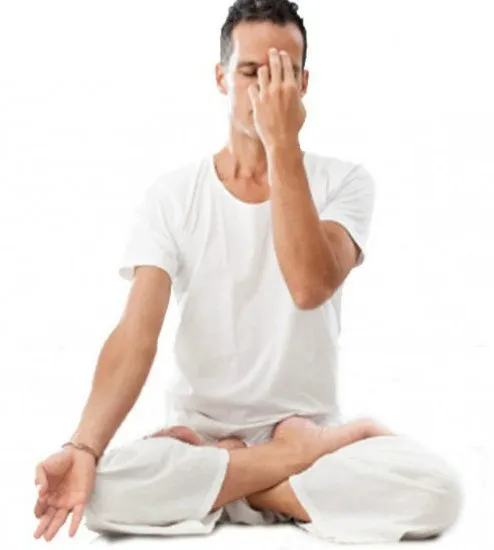
Frequently Asked Questions
Question: Is Psoriasis Contagious?
Answer: No, psoriasis is not a contagious disease.
Question: Who is at Risk of Psoriasis?
Answer: Individuals with stress, unhealthy lifestyles, poor digestion, or having a family history of psoriasis or suffering from autoimmune conditions are at high risk of having psoriasis.
Question: Is Psoriasis Curable?
Answer: From a modern perspective, psoriasis is manageable but not curable. However in Ayurveda, it takes longer treatment but with proper medication, lifestyle modification, and use of a specific diet, the root cause of diseases is treated and prevention of recurrence can be done.
Question: Can Yoga Help Manage Psoriasis?
Answer: Yes, along with proper use of Ayurvedic treatment yoga helps to reduce stress and also modulate immunity.
Question: What herbs are used in psoriasis?
Answer: The use of herbs varies from individual to individual. However, herbs like Bakuchi, Neem, Chakramarda, Khadir, Manjistha, etc are the most common herbs that are used in psoriasis.
Question: Can Psoriasis Affect Joints?
Answer: Yes, in a few cases, psoriasis can lead to a condition known as psoriatic arthritis in which stiffness in the joint and joint pain occur.
Question: What are the Common Triggers of Psoriasis?
Answer: Poor digestion, mental stress, incompatible food, infection, weather, and certain medications like corticosteroids are the common triggers of psoriasis.
Question: Can Psoriasis Recur?
Answer: Yes, as psoriasis is a chronic condition its reoccurrence is possible. However, if we follow the Ayurvedic diet, and use herbs as advised we can prevent reoccurrence.
Question: What is the Best Ayurvedic Oil for Psoriasis?
Answer: IAFA 333 oil is the best oil to treat psoriasis as it contains Shweta Kutaja, Shirish, Nimba, etc which are considered the best herbs for treating psoriasis.
Question: What is the Best Cream to Treat Psoriasis?
Answer: IAFA 333 cream is best for treating psoriasis as it contains Karanja seed, Nimba, Sirisha, coconut oil, etc which helps to treat psoriasis deep from the root.
Question: What is the Best Ointment for Psoriasis?
Answer: IAFA 333 cream is one of the best ointments for Psoriasis.
References
- Mahajan, Ketan & Sharma, Ansuya & joshi, Sneha. (2024). A Case Study on Ek-Kustha (Psoriasis) Ayurvedic Management. AYUSHDHARA. 86- 89. 10. 47070/ Ayushdhara. V- 11i2. 1459.
- Anshul, & Rohilla, Pooja & Kumar, Parvesh & Raheja, Shipra. (2020). Management of psoriasis through Ayurveda: case study. Environment Conservation Journal. 21. 177- 181. 10. 36953/ ECJ. 2020. 211223.
- Singh, & Rahman, Mahbubur & Yashika, & Kaur, Manveen & Anurag, (2023). A REVIEW ON PSORIASIS. NeuroQuantology. 20. 5786- 5793. 10. 48047/ NQ. 2022. 20. 16. NQ- 880588.
- Rendon, Adriana & Schakel, Knut. (2019). Psoriasis Pathogenesis and Treatment. International journal of molecular sciences. 20. 10. 3390/ ijms- 20061475.
- Boehncke, Wolf-Henning & Schon, Michael. (2015). Psoriasis. Lancet. 386. 10. 1016/ S0140- 6736 (14) 61909- 7.
- Armstrong AW, Read C. Pathophysiology, Clinical Presentation, and Treatment of Psoriasis: A Review. JAMA. 2020 May 19; 323 (19): 1945- 1960. doi: 10. 1001/JAMA. 2020. 4006. PMID: 3242- 7307.
- Kim WB, Jerome D, Yeung J. Diagnosis and management of psoriasis. Can Fam Physician. 2017 Apr; 63 (4): 278- 285. PMID: 2840- 4701; PMCID: PMC- 5389757.
- Yan BX, Chen XY, Ye LR, Chen JQ, Zheng M, Man XY. Cutaneous and Systemic Psoriasis: Classifications and Classification for Distinction. Front Med (Lausanne). 2021 Oct 13; 8: 649408. doi: 10. 3389/ fmed. 2021. 649408. PMID: 3472- 2555, PMCID: PMC- 8548430.
- Petit RG, Cano A, Ortiz A, Espina M, Prat J, Munoz M, Severino P, Souto EB, García ML, Pujol M, Sanchez- Lopez E. Psoriasis: From Pathogenesis to Pharmacological and Nano-Technological-Based Therapeutics. Int J Mol Sci. 2021 May 7; 22 (9): 4983. doi: 10. 3390/ ijms- 22094983. PMID: 3406- 7151; PMCID: PMC- 8125586.
Seek Expert Advice
Dr. Gupta’s IAFA is a pioneering center in the Ayurvedic management of various diseases including Psoriasis. IAFA Ayurveda ensures good results and relief to all suffering from the distressing effects of Psoriasis.
For Personalized Ayurvedic Treatment of Psoriasis, Contact Us Now!!! Visit IAFA and Feel the True Sense of Health through Ayurveda!!!
Was this Page Helpful?
So, IAFA’s Ayurvedic Treatment for Psoriasis is Just 3 Steps Away!

01. Connect With Us
Share your history of illness or Book your appointment

02. Consult With Us
Dr. Gupta a certified Ayurvedic Allergist Consultant

03. Root Cause Treatment
Get an accurate diagnosis, medicines, diet & lifestyle change
Real Case Studies – Successfully Treated Patients
Real Case Studies of Successfully Treated Patients from All Around the World by IAFA Ayurveda®

9 Year Old Female Patient Recovered from Chronic Allergic Bronchitis – A Case Study
This case study presents a 9-year-old female patient who has successfully recovered…

12-Year-Old Child Recovered from Sun Allergy and Polymorphous Light Eruption (PMLE) – A Case Study
This is a case study of a 12-year-old child who has successfully…

40-Year-Old Female Patient Recovered from Dyshidrotic Eczema and Onychomycosis – A Case Study
This case study highlights the successful recovery of a 40-year-old female patient…

40-Year-Old Female Patient Recovered from Urticaria and Angioedema – A Case Study
This case study focuses on a 40-year-old female patient who has successfully…
Read More Articles

Bed Wetting (Shayyamutra)
Bedwetting is an embarrassing habit in some children where they are unable…

Attention Deficit Hyperactivity Disorder – ADHD (Vatika Unmada)
Contact IAFA Ayurveda® to get safe and natural remedies for the treatment…

